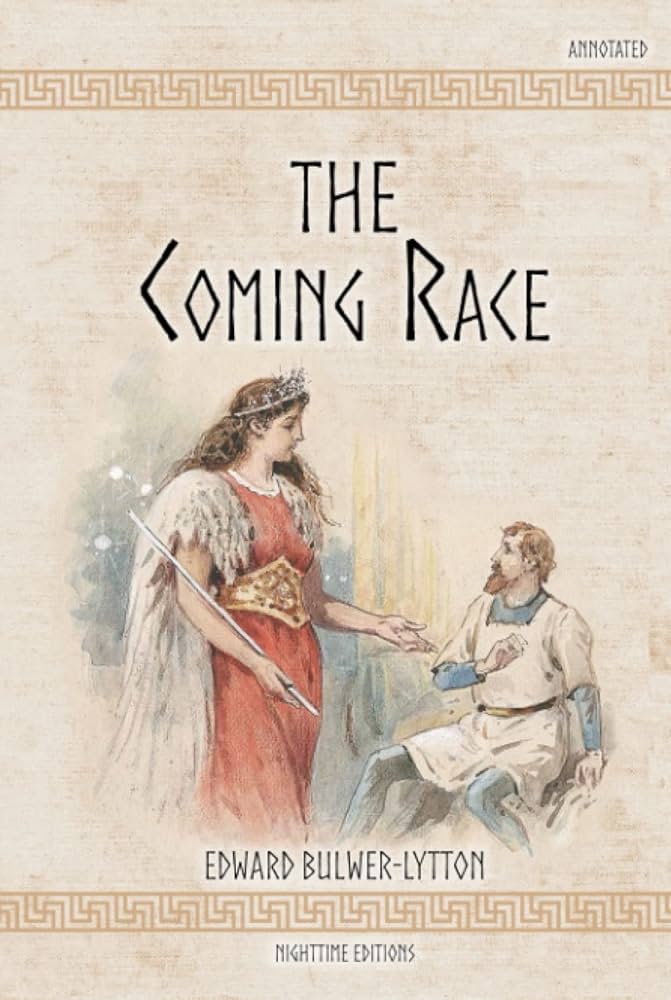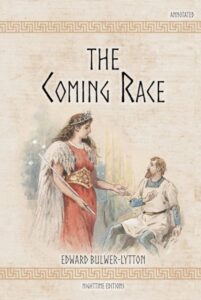Chapter VII — The coming Race
byChapter VII opens with the narrator settling into a private chamber once occupied by Zee, a space that diverges from the grandeur typically associated with the Vril-ya’s architecture. Its design, understated yet purposeful, features walls covered in softly colored matting and a modest bed that suggests simplicity rather than luxury. A small aviary hums with life, filled with exotic birds whose songs form harmonies so refined they sound nearly orchestrated. The environment feels like a sanctuary for quiet thought, yet it also subtly reveals the integration of beauty and utility in Vril-ya culture. Their sense of domestic comfort does not rely on excess but instead highlights harmony between nature and intellect. Even in personal quarters, the Vril-ya express their values through deliberate restraint. Their notion of elegance, unlike surface society’s fixation on ornament, emerges from balance and function.
Soon after the narrator begins reflecting on his surroundings, his host and Zee visit, eager to discuss his origins. They express curiosity but remain composed, neither astonished by his tales nor quick to judge, instead responding with calm scrutiny. When the narrator proudly references the achievements of his homeland—especially the democratic ideals and the bustling progress of New York—he meets a gentle but unmistakable skepticism. Democracy, which he promotes as a vehicle of fairness and freedom, seems to the Vril-ya a source of chaos and inefficiency. To them, rule by majority appears unstable compared to their own form of wise hereditary governance, overseen by a body of sages. In their view, peace and prosperity are preserved not by popular opinion, but by centuries of accumulated wisdom and the ethical use of vril. The narrator begins to sense that his world’s triumphs may not be as universal as he once believed.
As the dialogue deepens, the narrator recounts his unexpected descent into their subterranean world and attempts to convey the scientific and social structures of the upper earth. The Vril-ya listen with polite interest but remain unmoved by tales of steam engines, telegraphs, or national debates. They regard such progress as primitive when measured against their own mastery of vril—an energy that fuels transport, heals injury, alters weather, and even manipulates thought. With vril, barriers between mind and matter dissolve, allowing physical actions to be performed through will alone. This capacity places the Vril-ya in what appears to the narrator as a nearly godlike position. However, what strikes him most is not their power, but their composed responsibility in using it, hinting at a maturity that goes beyond technological success.
Toward the close of the chapter, a solemn understanding is reached. The host proposes that details about the narrator’s surface world be kept confidential, arguing that sharing such knowledge could disturb their people’s peace. The narrator agrees, recognizing the potential danger of curiosity untempered by caution. Zee mentions, almost casually, that memories can be erased using vril—an ability that sends a quiet chill through the narrator, despite the gentleness of her tone. In their world, control over information is not only possible but considered necessary for the preservation of harmony. This revelation underscores the ethical complexity of their power—what is meant for good could so easily veer into coercion if placed in less scrupulous hands. As the conversation ends, the narrator is left with more questions than answers, particularly about the line between knowledge and danger.
The discussion sheds light on the delicate tension between exploration and protection, advancement and restraint. In the Vril-ya’s eyes, true progress is not measured by how far one can reach but by how wisely one manages what they possess. Their choice to limit exposure to external influence reflects a commitment to social balance over expansion or conquest. While the surface world tends to equate growth with success, this subterranean society values inner coherence above all. It suggests a model of civilization where maturity lies not in what can be achieved but in what should be preserved. This philosophical divide forms the core of the narrator’s growing unease: in confronting a culture so advanced yet so inwardly cautious, he is forced to reevaluate the virtues he had assumed were universally admirable.


